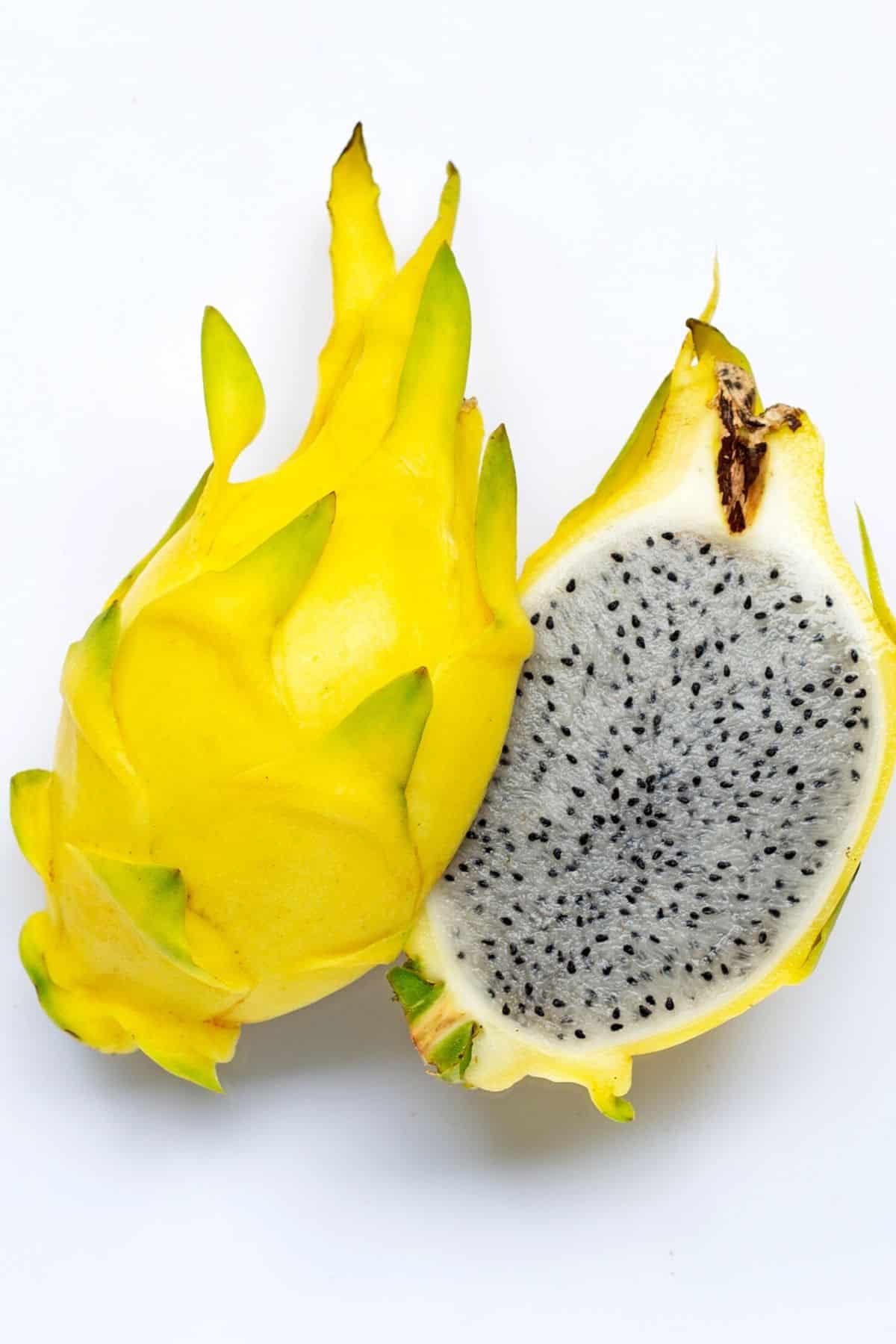9+ Reasons to Eat Yellow Dragon Fruit
Dragon fruit, also known as pitaya, is a tropical fruit from South America. It is often eaten for breakfast or as a snack, and can be found in many grocery stores. But what exactly is dragon fruit and what are the health benefits of eating it? In this article, I’ll answer all of your questions about the benefits of eating yellow dragon fruit including how it relieves constipation and acts as a natural laxative!

What is Dragon Fruit?
Dragon fruit is a tropical fruit that is native to Central and South America. The dragon fruit plant grows on a cactus, and the fruits can be either red, yellow or white.
The most common type of dragon fruit in North America is the red dragon fruit, which has a bright pink skin, tiny black seeds, and white flesh. Dragon fruit is often eaten raw, and has a slightly sweet taste.

There are exactly several different types of dragon fruit, most of which are available for sale in the United States.
- Hylocereus megalanthus is a species of cactus that is native to Central America. It is also known as the giant dragon fruit, and can grow up to 3 meters in height! The dragon fruit from this cactus plant is red or yellow, and has a pink flesh. Sometimes the yellow skin can have green scales.
- Hylocereus undatus is a species of dragon fruit that is native to Mexico and South America. It is also known as the white dragon fruit, and has a white skin and white flesh. The dragon fruit from this cactus is often eaten for breakfast or as a snack, and has a slightly sweet taste.
- Hylocereus costaricensis is a species of dragon fruit that is native to Costa Rica. It is also known as the red dragon fruit, pink dragon fruit, or strawberry pear dragon fruit, and has a bright pink skin and red flesh. This is the most common type of dragon fruit varieties and is the one most often found in North America.
It can take up to 3 years for a dragon fruit plant to mature and produce fruit.
Dragon fruit is ripe when it is soft to the touch and has a sweet taste.
Dragon Fruit Nutrition
Dragon fruit is a good source of vitamins C and B, as well as minerals such as calcium and phosphorus.
It also contains antioxidants that can help protect your cells from damage. One cup of dragon fruit provides about 60 calories and 15 grams of sugar.
There is limited research on the prebiotic potential of dragon fruit, but some preliminary studies suggest that dragon fruit may contain prebiotic compounds. Prebiotics are substances that promote the growth of beneficial bacteria in the gut, and can have a number of health benefits.
You may like my related article with the best natural probiotics.
Why You Should Eat Dragon Fruit
The additional health benefits of dragon fruit include its ability to boost immunity, improve digestion, and aid in weight loss.
In fact, yellow dragon fruit specially has gone viral on TikTok because of its purported ability to act as a natural laxative to relieve constipation.
Dragon fruit is also thought to have anti-inflammatory properties, and may help to lower blood sugar levels.
The yellow skinned variety of dragon fruit should yield the same healthy benefits as the other types.
Here is some additional information about the potential health benefits of the yellow variety of this exotic fruit.
1. Rich in Antioxidants
Dragon fruit is packed with antioxidants, which help to combat oxidative stress, free radicals, and inflammation. These include betacyanins, hydroxycinnamates, and flavonoids.
The yellow fruit may not have as many antioxidants as other types, but it is still a good source of antioxidants.
See my full list of red colored fruits which includes red dragon fruit.
2. High in Fiber
Like many fruits, dragon fruit is high in dietary fiber, which is beneficial for your digestive system.
Fiber can help prevent constipation, promote a healthy gut, and may contribute to weight loss as it can make you feel full for longer.
One cup of yellow dragon fruit will have between 5-6 grams of fiber.
Due to the high fiber content and perhaps some enzymes, yellow dragon fruit has anecdotal evidence that it may act as a natural laxative which can relieve constipation.
If you are uncertain how eating dragon fruit (of any color) may affect your bowel habits, you may wish to start with a small amount to make sure it agrees with you.
You may also like my recipe for this Constipation Relief Smoothie!
3. Vitamin C
Dragon fruit is a good source of vitamin C, which is known for boosting the immune system and helping to protect the body from common illnesses and infections.
See my Lemon Ginger Shot which is also very high in vitamin C.
4. Loaded with Prebiotics
Yellow dragon fruit contains prebiotics, which feed the beneficial bacteria called probiotics in your gut (get my full list of foods with natural probiotics).
Eating foods that contain prebiotic fibers can help improve the balance of good bacteria in your gut, which is important for digestion and overall health.
5. Good Source of Magnesium
Dragon fruit offers a good amount of magnesium, a nutrient needed for a variety of body functions.
These include muscle contractions, bone health, and the production of DNA.
6. Iron and Vitamin B3
Dragon fruit is a good source of iron and vitamin B3.
Iron is essential for blood health and the transport of oxygen throughout your body, while vitamin B3, or niacin, can help to reduce cholesterol levels and support skin health.
7. Low in Calories
Despite its sweet taste, dragon fruit is relatively low in calories. This makes it a good choice for anyone looking to control their calorie intake.
Be sure to speak to your doctor if you have diabetes or blood sugar issues to make sure that eating tropical fruits is okay for you (see my article on natural sugars versus added sugars).
8. Promotes a Healthy Gut
Dragon fruit’s prebiotic attributes may encourage a healthy gut, as it promotes the growth of beneficial bacteria.
See my related article on nutrients and foods for gut health.
9. Skin Health
Thanks to its vitamin C content, dragon fruit can also help maintain healthy skin.
Vitamin C plays a vital role in collagen production, which helps to keep the skin firm and youthful.
Dragon Fruit Season
Dragon fruit is in season from June to August.
However, it can be found year-round in most grocery stores. It will be the most budget-friendly when it’s in season though.
Storing Dragon Fruit
Dragon fruit can be stored at room temperature for up to two days. If you need to store dragon fruit for a longer period of time, it can be kept in the fridge for up to one week.
Tropical fruits are best eaten when they are at the height of their ripeness. But, don’t let them get over-ripe or they can become mushy.
How to Eat Dragon Fruit
Dragon fruit can be eaten raw or cooked.
When eating raw dragon fruit, you can simply cut it in half and scoop out the flesh with a spoon. The dragon fruit skin is edible, but some people prefer to remove it before eating (the skin is tasteless and can be bitter).
Dragon fruit can also be used in cooked dishes or salads. It can be added to smoothies, ice creams, juices, or desserts. Dragon fruit is a good source of antioxidants and vitamins, so it’s a healthy addition to your diet.
See my recipe for a Dragon Fruit Smoothie.
Flavor
Dragon fruit tastes sweet, juicy, and a little tangy. Some people say that dragon fruit tastes like a cross between a kiwi and a strawberry. It is juicy and has a slightly tangy taste with a sweet flavor. Some people also say that it has a berry-like taste.
Yellow pitaya (also called yellow pitahaya) tastes similar to the ones with bright red skin. Try to avoid unripe dragon fruit as it won’t taste as good.
See my related list of yellow fruits.
FAQs
Yes, dragon fruit can be frozen. To freeze dragon fruit, first wash and slice the fruit. Then place the slices in a single layer on a baking sheet, and freeze overnight. Once the slices are frozen, place them in a freezer-safe container or bag.
Dragon fruit is generally not expensive, but it can be depending on the season and where you are located. It can be found in most grocery stores, and the price varies depending on the type of dragon fruit.
There is no definitive answer, but dragon fruit is definitely a healthy fruit that provides a variety of nutrients and health benefits. It is a good source of vitamins C and B, as well as minerals such as calcium and phosphorus. Dragon fruit also contains antioxidants that can help protect your cells from damage.
There are potential side effects of eating any foods. For yellow dragon fruit, there is the risk of allergic reactions and the risk of digestive issues from consuming fiber. People with sensitive systems may experience a laxative effect after eating too much dragon fruit. For this reason, some people consider yellow dragon fruit to be a natural laxative.
Don’t Miss These Fruit Articles!
Conclusions
Dragon fruit is a tropical fruit that has numerous potential health benefits. It can be found at many grocery stores, and it is often eaten for breakfast or as a snack. Yellow dragon fruit is especially exotic in appearance but has many of the same health benefits as regular dragon fruit.
Don’t forget to join my newsletter list to get exclusive clean eating recipes and tips. The newsletter is 100% free with no spam; unsubscribe anytime.
About the Author: Carrie Forrest has a master’s degree in public health with a specialty in nutrition and is studying to be a holistic nutritionist. She is a top wellness and food blogger with over 5 million annual visitors to her site. Carrie has an incredible story of recovery from chronic illness and is passionate about helping other women transform their health. Send her a message through her contact form.
Note: this post is for informational purposes only and is not intended as medical advice. Please consult your healthcare provider for recommendations related to your individual situation.





















Dragon fruit has a laxative effect. It acts within a couple of hours and the impact lasts for many hours. Half a fruit is sufficient. Watch out for the quantities you eat.